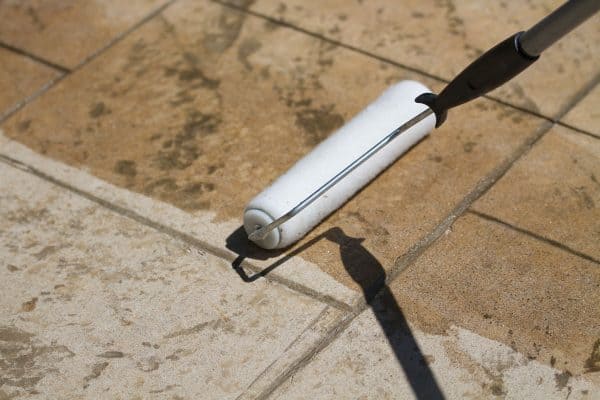Disclosure: We may get commissions for purchases made through links in this post.
Pool decks are a whole different kind of pavement. They are exposed to water and sun and other environmental conditions all the time. As such, they present specific requirements for the hardscape material that you can use. In case you're wondering if you can get porcelain pavers for your pool decks, that's what we'll be discussing in this article. We asked experts if these pavers are good for pool decks, and here's their answer.
Porcelain pavers are good for pool decks because these blocks are safe and durable to use. These paving materials are easy to maintain and can resist mold and mildew. These pavers are also budget-friendly and offer great visual effects for your hardscape next to the pool. These qualities are ideal for the moist environment and extreme weather conditions in this particular area of your lawn.
Keep on reading so we can tell you more about these qualities of porcelain pavers that make them such great paving materials for your pool deck. We'll also be comparing pavers with concrete to find out which is the better option between the two. Let's get this started!
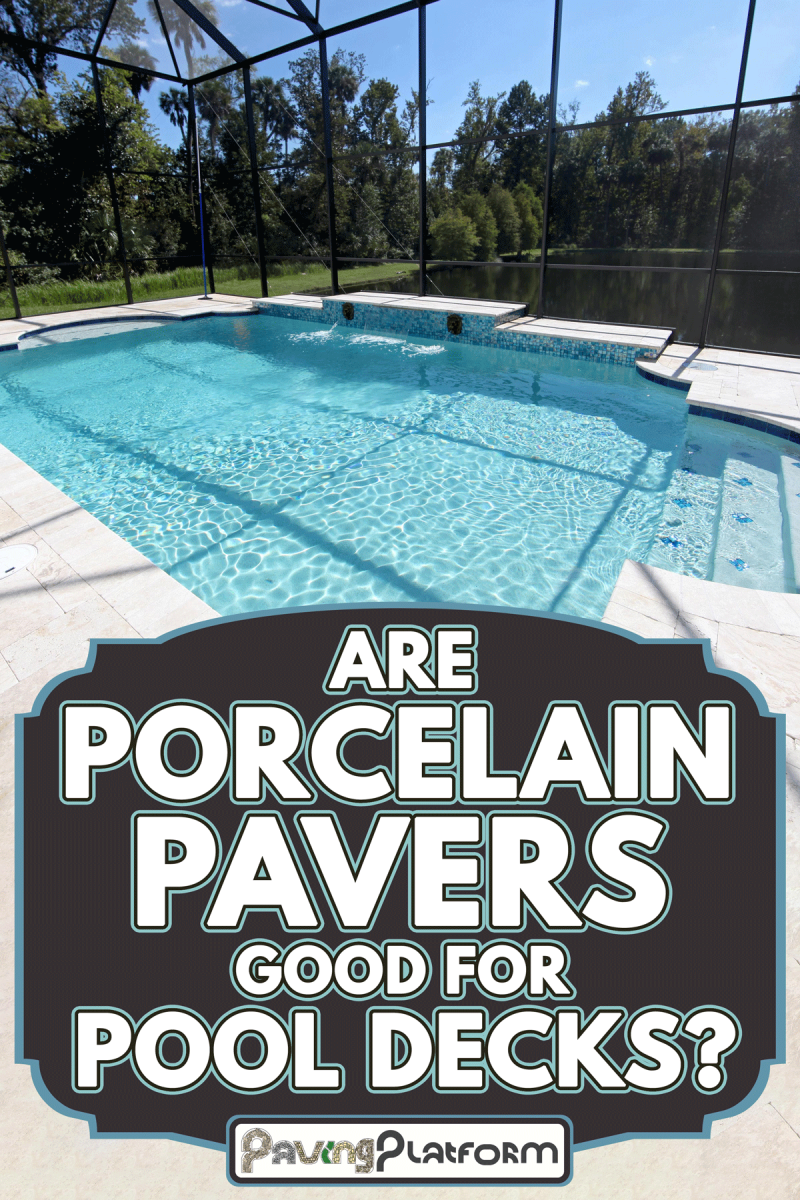
What are the benefits of porcelain pavers for pool decks?
Porcelain pavers are one of the most popular paving materials used for various outdoor hardscaping projects. These blocks are made from kiln-fired clay and imprinted with the exact grains of wood or natural stones. They also come in different colors, sizes, textures, and finishes to help you come up with an astounding look for your outdoor area
No wonder porcelain pavers are one of the most recommended hardscaping materials for this side of your yard. But of course, you need to find out for yourself why this is so. That's why we've listed the advantages of using these pavers on your pool deck.
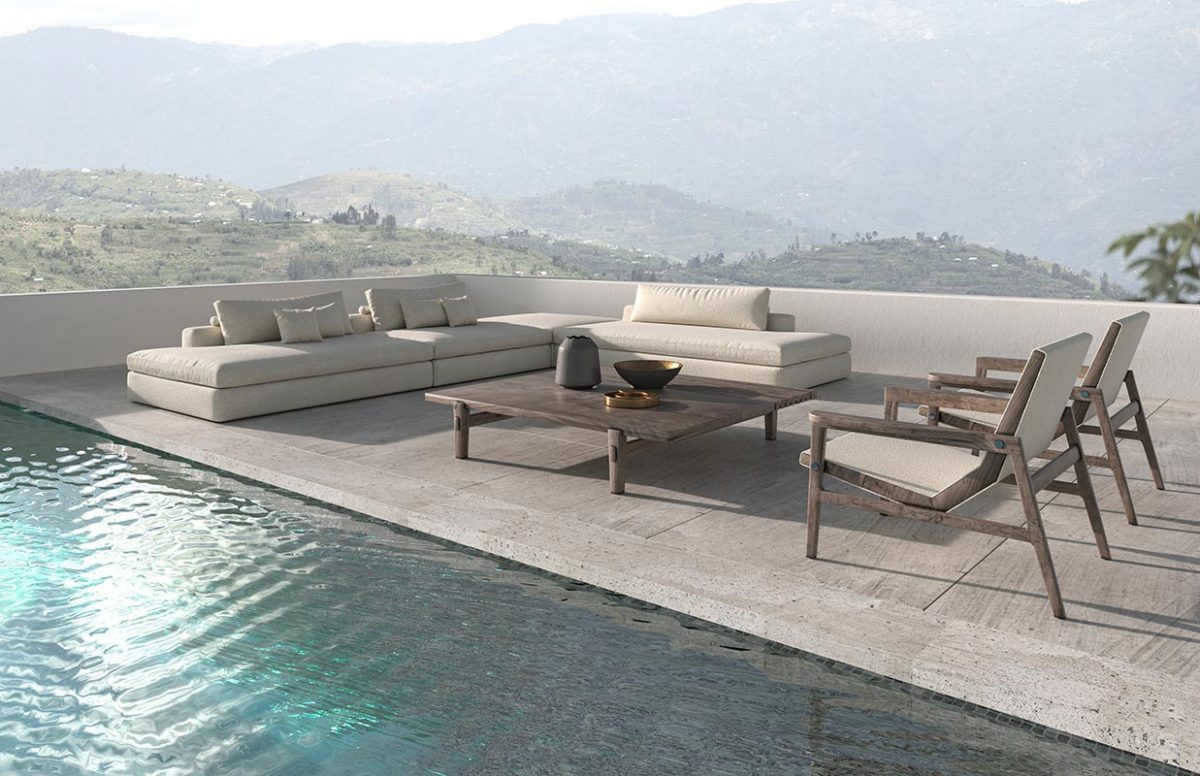
Durable
Of course, one of the top considerations for outdoor pavement is its durability especially since it is going to be exposed to extreme weather conditions. Porcelain pavers are very durable paving materials. If installed and maintained the right way, they can last for decades.
Thanks to advanced manufacturing processes, each of these blocks can endure 2,200 lbs of weight. They can resist damage caused by heat, ice, frost, and snow. They can tolerate extreme temperatures from -40 to 201 degrees Fahrenheit. They are not prone to pest infestation and moisture problems. This means that the structural integrity of your pool deck won't be compromised.
Safe: Non-slip Finishes
Porcelain pavers are safe to use for your pool deck. Even if they get wet, their surface isn't slippery. This reduces the risk of accidents happening. As we always say, safety should be your top priority. This is true especially if you have kids who love to run around the pool or elders who benefit from physical exercise and water therapy at the pool.
Although porcelain pavers have innate anti-slip properties, it would still be best to get blocks that have a textured finish as this offers a better grip. Those with polished and smooth finishes can get slippery when wet because there's nothing in there where your foot can hold onto.
You can also check with your supplier regarding the grip factor rating of the paver. The higher the grade, the safer it is to use for your pool deck since it has better slip resistance.
It is also worth noting here that these paving tiles are fire-resistant so you won't have to worry when you're having grill parties by your pool.
Resists Mold and Mildew
Mold and mildew thrive best in a moist environment. Since your pool deck gets wet all of the time, it can be a breeding ground for these unwelcome foreign particles. Porcelain pavers have a non-porous surface. This means water will not stay on their surface. It will either evaporate or be displaced towards the proper drainage.
Aside from being mold and mildew resistant, this paver type also has antimicrobial properties which make them the more sanitary choice for your hardscape.
Easy to Maintain
One of the best things about porcelain material is that it requires minimal effort for its upkeep and maintenance. You can clean it using a broom to remove any loose dirt on the surface. You can also use a mop soaked in soapy water for thorough cleaning. When there are drips and spills, you can just wipe them off the surface.
Porcelain pavers don't require periodic sealing. By themselves, they resist stains so you won't have to worry about having unsightly marks on their surface caused by constant exposure to water, salts, and other chemicals. If there are damaged parts, you can simply remove and replace the blocks to repair your pool deck pavement.
Visual Effects
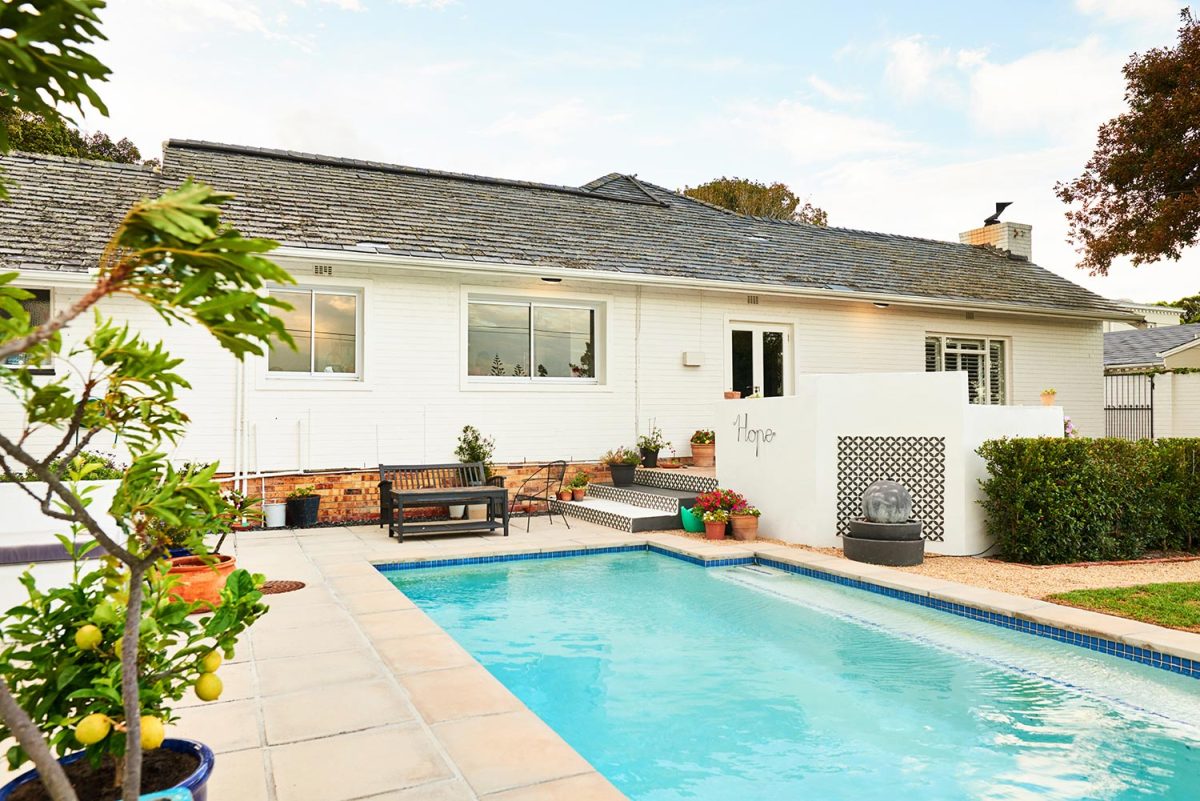
As mentioned earlier, porcelain pavers have been imprinted with wood and natural stone images, making them look exactly like these beautiful paving materials. What's even better is that they won't fade. You can enjoy your pool deck's elegant look for a long time.
There are also so many options to choose from when it comes to color, finish, design, and pattern. Once these pavers are laid, you'll have an attractive pool deck that'll enhance your pool area's looks and charm.
Budget-friendly
Budget is always an important consideration for any home improvement project. But this won't be a problem with porcelain pavers. At $5 to $10 per square foot, this is one of the most affordable options out there. For its price, you get to enjoy the elegant look of wood and natural stones which would cost you up to three times your budget if you'll get these materials.
But of course, there's also a drawback in using porcelain pavers. You'll have to hire an experienced contractor for this job to make sure that it is done right. For those planning to install these pavers by themselves, better think twice so you won't end up regretting your decision.
Are pavers or concrete better for pool decking?
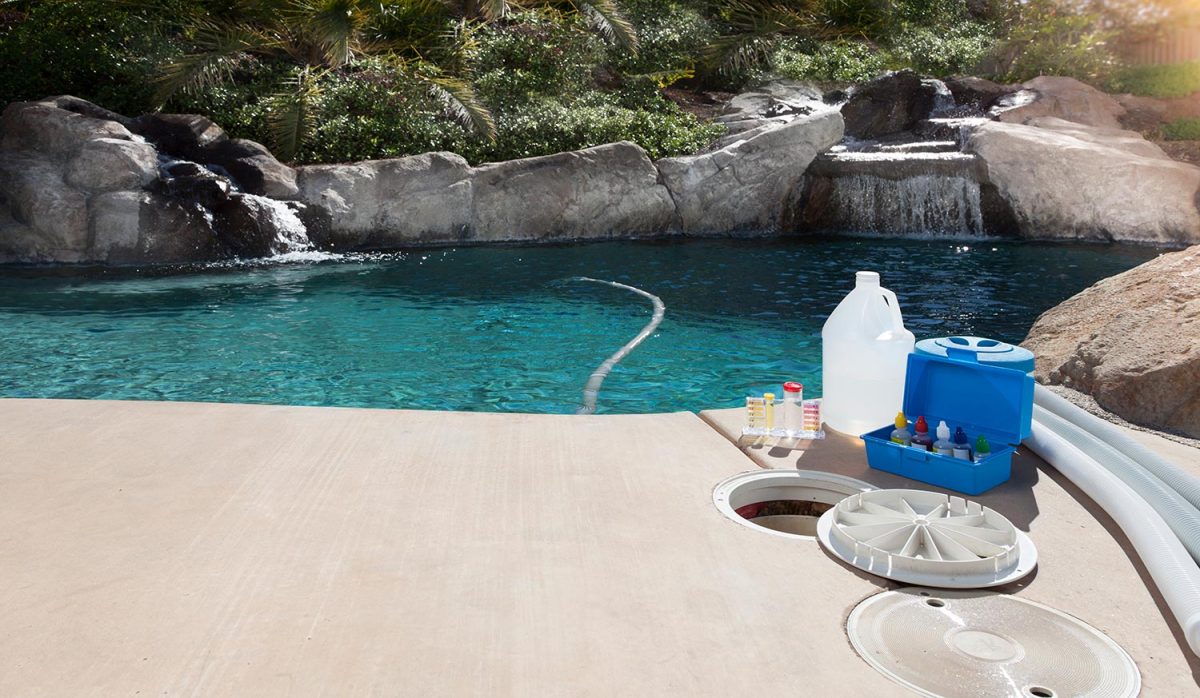
Concrete and pavers are two of the most popular choices when it comes to hardscaping materials for pool decks. Since we've already enumerated the benefits of using porcelain pavers, let's have a quick rundown of the pros and cons of concrete.
Advantages of Concrete
Concrete pavement can refer to poured concrete or stamped concrete. Poured concrete is just a plain large slab while stamped concrete has been embossed with different patterns to make it look like bricks, tiles, wood, and other materials.
Like pavers, concrete pavement is affordable to install because concrete itself is not expensive. If you have it stamped, you can copy the look of the other hardscaping materials. You can also have it stained or dyed to enhance its appearance.
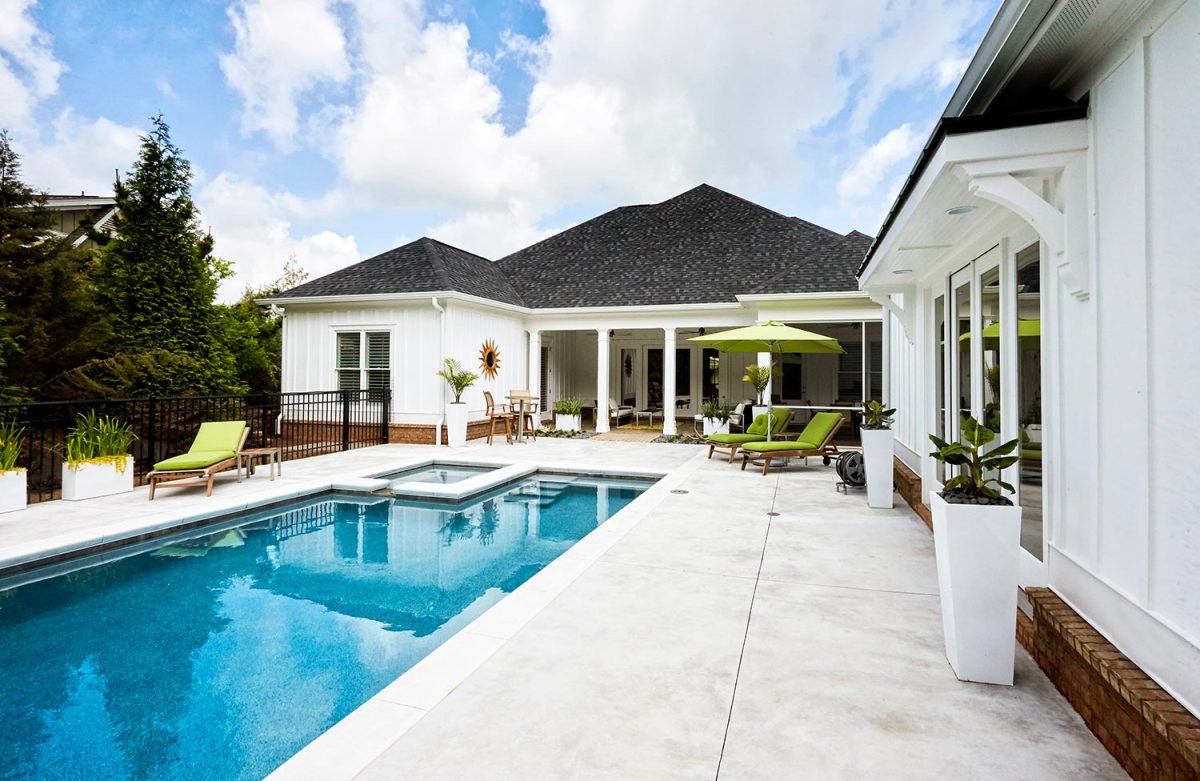
The concrete surface is also easy to clean. The same cleaning techniques on pavers can be applied to this hardscape.
Disadvantages of Concrete
Concrete can be slippery when wet unless you apply anti-slip sealers, pads, and other measures so that its surface will offer more grip. It also requires ongoing maintenance. You need to seal its surface regularly to protect it from the weather and other elements. Otherwise, it might erode or crack and you'd have to spend for repairs. The cost would depend on the extent of the damage.
Concrete's color is also bound to fade over time. When this happens, your pool deck wouldn't look as appealing as before.
Verdict
Given the above qualities of both porcelain pavers and concrete, we can say it's better to use pavers for your pool deck. Pavers are safer, longer-lasting, can maintain their nice appearance, and require little maintenance.
Final Thoughts
Porcelain pavers are a good choice for your pool decks. Go ahead and choose which design and pattern would look great at the edge of your pool and let the water fun begin!
For more resources about pavers, you may read the following posts:
Choosing Natural Stone Pavers: Bluestone Vs. Flagstone Vs. Slate

![Vibrant Red Paver Stone Path, Can You Spray Paver Sealer? [How To Apply It]](https://pavingplatform.com/wp-content/uploads/2022/04/Vibrant-Red-Paver-Stone-Path-600x400.jpg)
![Properly laid out red pavers for a garden, Can You Tint Paver Sealer? [And How To]](https://pavingplatform.com/wp-content/uploads/2022/04/Properly-laid-out-red-pavers-for-a-garden-600x400.jpg)
